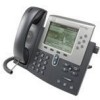Cisco 7962G User Guide - Page 68
Accessing Voice Messages
 |
UPC - 882658140341
View all Cisco 7962G manuals
Add to My Manuals
Save this manual to your list of manuals |
Page 68 highlights
Accessing Voice Messages To access voice messages, use the Messages button Note Your company determines the voice message service that your phone system uses. For the most accurate and detailed information, refer to the documentation that came with your voice message system. If you want to... Set up and personalize your voice message service Check for your new voice messages Then... Press and follow the voice instructions. If a menu appears on your screen, choose an appropriate menu item. Look for: • A steady red light on your handset. (This indicator can vary. See Customizing Rings and Message Indicators, page 52.) • A flashing message waiting icon and text message on your phone screen. Note The red light and message waiting icon display only when you have a voice message on your primary line, even if you receive voice messages on other lines. Listen to your voice messages or access the voice messages menu Send a call to a voice message system Listen for: • A stutter tone from your handset, headset, or speakerphone when you place a call. Note The stutter tone is line-specific. You hear it only when using the line with the waiting messages. Press . Depending on your voice message service, doing so either auto-dials the message service or provides a menu on your screen. When you connect to a voice message service, the line that has a voice message is selected by default. If more than one line has a voice mail, then the first available line is selected. Ask your system administrator about options to always connect to the voice message service on the primary line. Press iDivert. For more information, see Sending a Call to a Voice Message System, page 26. 60 OL-19613-01















